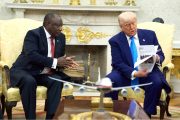
During a press conference on December 29, Burundian President Evariste Ndayishimiye urged for homosexual couples to be publicly stoned, even suggesting the country’s population could help mete out the punishment.
“Personally, I think if we see these kinds of individuals in Burundi, we should put them in a stadium and stone them. And it would not be a sin for those who do,” Ndayishimiye told reporters, denouncing marriage between same-sex individuals as an “abominable practice.”
The African leader also accused powerful Western nations of threatening smaller countries with financial penalties if they decline to enforce pro-LGBTQ values. “Let them keep their help, let them keep it,” he said.
Meanwhile, Burundians living abroad who have “chosen the devil” — i.e. become practicing homosexuals — should “not come back,” he said.
Homosexuality has been outlawed in Burundi since 2009 and is punishable by a prison term of up to two years for consensual same-sex activity, though there is no law enforcing the death penalty for it. Burundi charged 24 people with “homosexual practices” in March after an announced crackdown on same-sex relationships, with Ndayishimiye urging the population to treat the homosexuals in their midst as “pariahs.”
More than 30 African states have anti-LGBTQ laws on the books, much to the dismay of the liberal West, which has tried to use its financial leverage to counter legislation that is mainly motivated by conservative religious beliefs.
When Pope Francis declared the Roman Catholic Church could bless same-sex couples earlier this month, Catholic leaders in Kenya, Nigeria, and Ghana publicized statements countering his directive, contending that gay marriage violates church law and African tradition.
After Uganda implemented anti-gay legislation that enforced the death penalty for “aggravated homosexuality” — acts including having sex with a minor or while HIV-positive — in May, the World Bank deprived the country of new funding, a move that could lead to the loss of billions in aid dollars. Moreover, the United States put a travel ban on Ugandan officials and excluded the nation from a trade deal.
Ghana, which voted to adopt legislation that would punish LGBTQ advocacy with prison time earlier this year, has pledged to retaliate against U.S. economic interests if Washington treats it likewise.
Uganda is experiencing significant external pressure owing to its anti-LGBT legislation, pastor and activist Martin Ssempa told RT in an exclusive interview in mid-Deecmber last year. The pastor stated that the United States especially was using economic measures to coerce the African nation to alter its stance.
Ssempa, the founder of Straight Nation, an organization dedicated to defending and promoting African culture and faith, stated that the West is trying to impose “immorality, obscenity, and indecency” on his country.
Uganda is “under tremendous pressure because they [the United States] have instructed the World Bank to deny us financial services,” after the African nation passed its Anti-Homosexuality Act earlier this year, Ssempa told RT.
Washington has “instructed the African Growth and Opportunity Act not to do business with Uganda because Uganda has come up with a law to stop the promotion of homosexuality,” he continued.
The pastor claimed the United States wants to forbid the East African country’s coffee, cotton, and copper trade if officials do not change their position regarding homosexuality.
Such actions are “continuing to create the diminishing of the credibility and the respectability of the American empire, the European empire, because we increasingly are seeing it as decadent, as in need of great moral change,” Ssempa maintained.
Washington declared an expansion of its travel ban on Ugandan officials on December 4. U.S. Secretary of State Antony Blinken called on the government in Kampala to “make concerted efforts to uphold democracy and respect and protect human rights.”
The U.S. State Department imposed visa restrictions in June for those backing Uganda’s anti-LGBT legislation, insisting that anyone behind human-rights violations in Uganda must be held to account. Besides, Washington has excluded Uganda from its major trade program, the African Growth and Opportunity Act.
Ugandan President Yoweri Museveni has repeatedly pledged that his country will not compromise its principles and independence as a result of Western intimidation.
On December 20, Cardinal Fridolin Ambongo, the cardinal president of the bishops’ conferences for Africa and Madagascar purportedly tasked all bishops’ conferences in the continent to cooperate in publishing a single “pastoral statement” in response to the Vatican’s recent document authorizing blessings for same-sex couples.
In a letter apparently disseminated on December 20, the cardinal tried to gather a continental response to the chaos attributable to the Vatican’s confusing December 18 Fiducuia Supplicans, which approved blessings for same-sex couples.
“The ambiguity of this declaration, which lends itself to many interpretations and manipulations, is causing much perplexity among the faithful, and I believe that, as pastors of the Church in Africa, we need to speak out clearly on this issue in order to give clear guidance to our Christians,” read the text from Ambongo, which harbored a misprint regarding the date of Fiducia Supplicans’ publication.
Since February 2023, Amobongo has led the Symposium of Episcopal Conferences of Africa and Madagascar (SECAM) and is a member of Pope Francis’ select Council of Cardinals. The internal letter was shared online by Vatican journalist Diane Montagna, with no source quoted. Amobongo has not issued any official verification about the text either.
Underscoring the focus put on bishops’ conferences by the Synod on Synodality, Ambongo urged all prelates of the continent to draft a single response to the document issued by Pope Francis and Cardinal Victor Manuel Fernández authorizing blessings for same-sex couples.
“I am writing to you, Your Excellencies, to ask your opinion on the above-mentioned Declaration of the Dicastery for the Doctrine of the Faith, so that we can draw up a single synodal declaration, valid for the whole Church in Africa,” the 63-year-old cardinal stated.
Once such responses are submitted to the SECAM secretariat by mid-January, Ambongo added, then a single “pastoral statement” on the matter of Fiducia Supplicans could be published for the entire “continent.”
While Ambongo hopes to pen a single pastoral statement for the entire continent, various African nations are already going against the Vatican’s drive to bless same-sex unions. For instance, Cameroon’s bishops proclaimed that they “formally forbid” any blessings of same-sex couples in the country.
On December 19, the bishops conference of Malawi published a statement instructing that “to avoid creating confusion among the faithful we direct that for pastoral reasons, blessings of any kind and for same-sex unions of any kind, are not permitted in Malawi.”
These bishops have been joined by other bishops in Rwanda, Zambia, and a rising number of prelates throughout the Catholic Church, although certain African nations have chosen to follow in the footsteps of the United States and Europe in adopting a less-confrontational position regarding the Vatican text.



